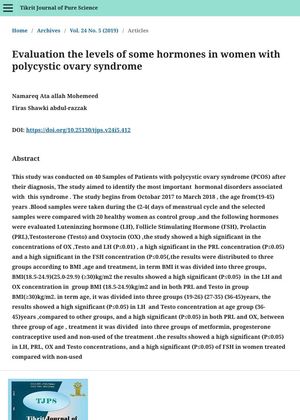Evaluation of Hormone Levels in Women with Polycystic Ovary Syndrome
September 2019
in “
Mağallaẗ Tikrīt li-l-ʻulūm al-ṣirfaẗ
”

TLDR Women with PCOS have higher levels of certain hormones compared to healthy women, and these levels vary with BMI, age, and treatment type.
In a study conducted from October 2017 to March 2018, 40 women diagnosed with polycystic ovary syndrome (PCOS) aged 19-45 were evaluated for hormonal disorders associated with the syndrome. The hormone levels of these women were compared with those of 20 healthy women. The hormones evaluated were Luteninzing hormone (LH), Follicle Stimulating Hormone (FSH), Prolactin (PRL), Testosterone (Testo), and Oxytocin (OX). The study found significant increases in the concentrations of OX, Testo, and LH, and significant increases in PRL and FSH concentrations. The results were further analyzed based on BMI, age, and treatment. The study found significant variations in hormone concentrations based on these factors. For instance, LH and OX concentrations were significantly high in the BMI group 18.5-24.9 kg/m2, and PRL and Testo were significantly high in the BMI group ≥30 kg/m2. Similarly, LH and Testo concentrations were significantly high in the age group 36-45 years. The study also found significant variations in hormone concentrations based on the type of treatment used.




